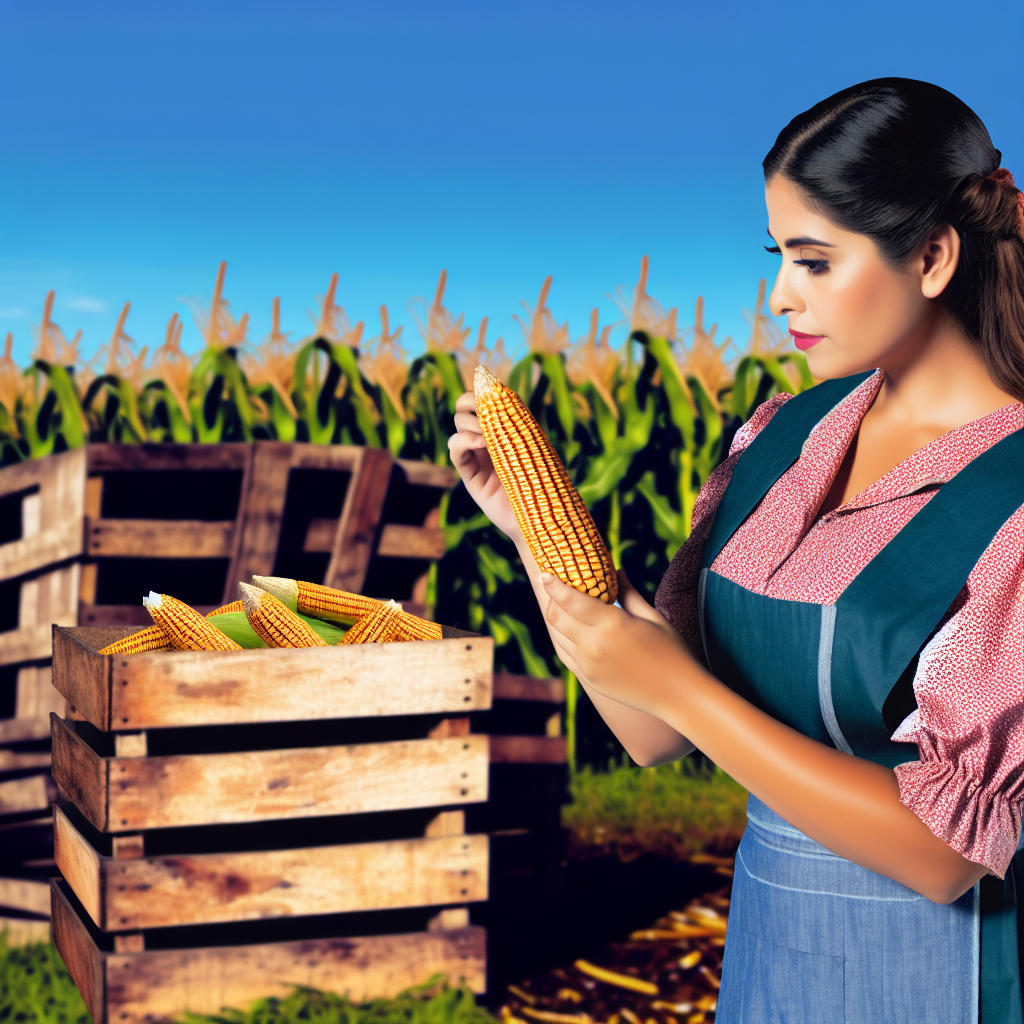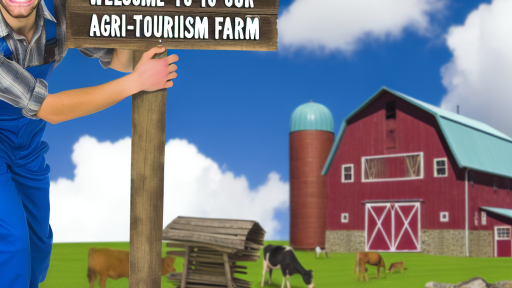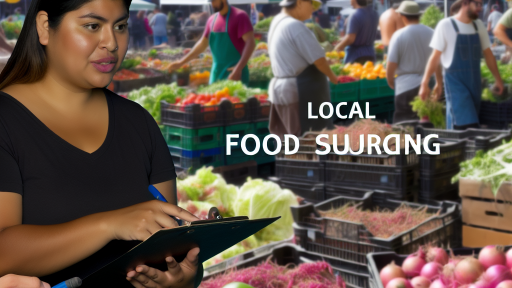Introduction to Local Food Supply Chains and Their Importance for Farmers
Local food supply chains create connections between farmers and consumers.
These chains play a crucial role in supporting local economies.
Farmers benefit from improved access to markets and better prices.
Additionally, local supply chains enhance food security for communities.
They offer fresh and nutritious food options to consumers.
Furthermore, these systems reduce transportation costs and emissions.
Understanding Local Food Supply Chains
A local food supply chain consists of various stakeholders.
These include farmers, processors, distributors, and consumers.
Each stakeholder plays a vital role in the chain’s success.
Farmers, at the helm, grow the food and directly connect with buyers.
Processing facilities can add value by preparing food for sale.
Distributors help transport products to local markets or restaurants.
Consumers are increasingly interested in knowing where their food comes from.
The Benefits for Farmers
Farmers enjoy higher profit margins in local food supply chains.
These systems allow them to retain a larger share of the food dollar.
Transform Your Agribusiness
Unlock your farm's potential with expert advice tailored to your needs. Get actionable steps that drive real results.
Get StartedMoreover, farmers can build meaningful relationships with customers.
This connection fosters brand loyalty and repeat business.
Farmers also have the opportunity to diversify their market channels.
This reduces their dependency on larger national distributors.
Building Stronger Communities
Local food supply chains contribute to community resilience.
They strengthen local economies by keeping money within the community.
Farmers can collaborate with local restaurants and schools.
Such partnerships create opportunities for direct sales.
Furthermore, these chains promote awareness of sustainable practices.
They cultivate a greater appreciation for locally sourced food.
Ultimately, local food supply chains benefit everyone involved.
Key Components of Local Food Supply Chains
Producers
Producers are the backbone of local food supply chains.
They include farmers, ranchers, and artisan food makers.
These individuals cultivate crops and raise livestock.
Moreover, they create processed foods such as jams or cheeses.
Local producers emphasize quality over quantity.
They often utilize sustainable practices that protect the environment.
This focus on sustainability attracts health-conscious consumers.
Distributors
Distributors play a critical role in connecting producers and consumers.
They ensure that food reaches local markets efficiently.
Moreover, distributors include food hubs and transportation services.
They help maintain the integrity of local foods during transit.
By collaborating with producers, they enhance food accessibility.
Also, distributors often prioritize local sourcing to reduce emissions.
Showcase Your Farming Business
Publish your professional farming services profile on our blog for a one-time fee of $200 and reach a dedicated audience of farmers and agribusiness owners.
Publish Your ProfileThis commitment fosters community relationships.
Consumers
Consumers are vital participants in local food supply chains.
They influence market trends through their purchasing choices.
Health-conscious consumers prefer fresh, locally-sourced foods.
This demand drives producers to adopt sustainable practices.
Community support strengthens local economies significantly.
Lastly, consumers often participate in farm-to-table initiatives.
This engagement creates a direct connection with local agriculture.
Benefits of Local Food Supply Chains for Farmers
Economic Advantages
Local food supply chains significantly increase farmers’ profits.
They reduce transportation costs and ensure fresher products.
This efficiency allows farmers to capture more of the food dollar.
Additionally, farmers can diversify their markets easily.
For example, direct sales at farmers’ markets enhance profitability.
By selling locally, farmers build customer loyalty and trust.
Such relationships often lead to repeat business and referrals.
Furthermore, local supply chains create jobs within the community.
Jobs in processing, distribution, and retail enhance the local economy.
Environmental Benefits
Local food supply chains promote sustainable farming practices.
They decrease carbon footprints by minimizing transportation distances.
Additionally, they encourage the use of local resources and inputs.
This strategy supports soil health and fosters biodiversity.
Moreover, local systems tend to use fewer synthetic inputs.
Farmers can adopt organic practices more easily in localized networks.
Healthy soils and ecosystems contribute to long-term agricultural sustainability.
Community Engagement
Engaging locals in food systems fosters community pride.
Farmers can connect directly with consumers through events and markets.
This interaction helps educate the public about agriculture.
Farmers become advocates for sustainable practices within their communities.
Moreover, community-supported agriculture (CSA) programs create strong bonds.
These bonds lead to increased consumer investment in local farms.
As a result, farmers gain stability and a loyal customer base.
Gain More Insights: How Agri-Tourism Enhances the Farm-to-Table Movement
Challenges Farmers Face in Navigating Local Food Supply Chains
Understanding the Complexity of Supply Chains
Local food supply chains are often complex and multifaceted.
Farmers manage relationships with various stakeholders.
These include distributors, retailers, and consumers.
Understanding each party’s role requires time and effort.
Additionally, coordinating logistics demands careful planning.
Market Access Limitations
Farmers often struggle to access local markets.
This issue arises from competition with larger producers.
Local farmers may lack visibility in mainstream channels.
Showcase Your Farming Business
Publish your professional farming services profile on our blog for a one-time fee of $200 and reach a dedicated audience of farmers and agribusiness owners.
Publish Your ProfileFurthermore, food distribution logistics can be daunting.
High transportation costs hinder farmers’ profitability.
Regulatory Challenges
Navigating government regulations can be overwhelming.
Farmers must comply with numerous health and safety standards.
Licensing and certification processes add additional hurdles.
These regulations often vary by state and locality.
Consequently, farmers may need legal assistance to ensure compliance.
Building Consumer Trust
Local farmers face challenges gaining consumer trust.
Many consumers are unaware of local farming practices.
Farmers need to communicate their sustainable practices clearly.
Additionally, transparency in sourcing is essential.
Engaging with the community helps build a loyal customer base.
Access to Resources and Support
Many local farmers struggle to access essential resources.
Financial support options can be limited for small farms.
Moreover, farmers may lack access to modern technology.
Training and educational programs can be beneficial.
Partnering with agricultural organizations can offer vital support.
Explore Further: Embracing Seasonal Produce in Farm-to-Table Systems
Strategies for Farmers to Strengthen Their Position in Local Food Supply Chains
Building Strong Relationships
Farmers should prioritize building strong relationships with local retailers.
Retailers are often eager to support local suppliers.
Additionally, attending community events can foster these connections.
Farmers can also collaborate with local chefs to promote their products.
These partnerships can lead to unique offerings and increased visibility.
Participating in Farmer’s Markets
Participating in farmer’s markets offers direct access to customers.
Farmers can showcase their products while engaging with the community.
This platform provides invaluable feedback from consumers.
Furthermore, it helps farmers understand local demand and preferences.
Regular attendance builds a loyal customer base over time.
Implementing Sustainable Practices
Sustainable farming practices attract conscientious consumers.
These methods can lead to increased trust and brand loyalty.
Farmers should highlight their sustainable practices in marketing efforts.
This can differentiate them from competitors using conventional methods.
Utilizing Social Media for Outreach
Social media serves as a powerful tool for outreach and education.
Farmers can share their story and connect with their audience.
Engaging content can include behind-the-scenes looks at their operations.
Additionally, sharing recipes or cooking tips can enhance engagement.
Joining Local Food Networks
Joining local food networks can amplify a farmer’s reach.
These networks often provide resources for marketing and education.
Moreover, they foster collaboration and knowledge-sharing among farmers.
Participating in these networks increases visibility in the community.
Showcase Your Farming Business
Publish your professional farming services profile on our blog for a one-time fee of $200 and reach a dedicated audience of farmers and agribusiness owners.
Publish Your ProfileEnhancing Product Diversity
Diversifying products can attract a wider customer base.
Farmers should consider growing a mix of traditional and specialty crops.
This strategy mitigates risk due to fluctuating market demands.
Additionally, seasonal offerings can keep consumers returning throughout the year.
See Related Content: Benefits of Local Food Sourcing for Sustainable Farms

Technological Innovations Impacting Local Food Supply Chains
Digital Platforms for Farmers
Farmers leverage digital platforms to connect with local consumers.
These platforms enhance visibility for small-scale producers.
Moreover, they streamline the search for fresh produce.
As a result, consumers easily find local food sources.
Mobile Applications Transforming Distribution
Mobile applications play a crucial role in distribution logistics.
Farmers use them to manage inventory and track deliveries.
This technology minimizes waste and increases efficiency.
For instance, apps like CropX provide real-time data for farmers.
Blockchain for Transparency and Trust
Blockchain technology ensures transparency in food supply chains.
It builds consumer trust by tracking product origins.
Farmers can showcase their sustainable practices effectively.
Consequently, customers gain confidence in their food choices.
Data Analytics for Yield Optimization
Data analytics tools help farmers optimize crop yields.
They analyze weather patterns and soil conditions.
This information enables informed farming decisions.
Ultimately, this leads to increased productivity and profitability.
Innovation in Sustainable Packaging
Innovative packaging materials reduce environmental impact.
Farmers are adopting sustainable options for food distribution.
This shift aligns with consumer demand for eco-friendly products.
As a result, businesses attract environmentally-conscious customers.
Precision Agriculture Technologies
Precision agriculture employs advanced technologies for farming decisions.
Farmers utilize drones and sensor technologies for monitoring.
This approach enhances resource management and reduces costs.
Ultimately, it leads to better yields and sustainable practices.
Delve into the Subject: Seasonal Eating Advantages for Local Farmers
Case Studies: Successful Local Food Supply Chains in Various Regions
Northeast Region Success Story
In the Northeast, Green Valley Farms adopted a community-supported agriculture (CSA) model.
This approach connects farmers directly with consumers.
Customers purchase shares of the farm’s produce for the season.
This provides farmers with financial stability and ensures fresh produce for the community.
Midwest Innovation
In the Midwest, Harvest Bounty Co-op has created a network of small farms.
This co-op pools resources for marketing and distribution.
By working together, farmers reduce costs and reach wider markets.
Consequently, they increase their profits and customer base.
Southwest Community Engagement
In the Southwest, Sunflower Market focuses on local outreach.
They host regular community events to educate the public about local foods.
Showcase Your Farming Business
Publish your professional farming services profile on our blog for a one-time fee of $200 and reach a dedicated audience of farmers and agribusiness owners.
Publish Your ProfileMoreover, they promote the importance of supporting local farmers.
This builds stronger relationships between consumers and producers.
Pacific Northwest Sustainability Practices
The Pacific Northwest showcases the success of Urban Ag Alliance.
This initiative combines urban farming with food education programs.
Local residents engage in farming projects to promote sustainability.
As a result, they create awareness of healthy eating and environmental stewardship.
General Observations and Trends
Across these regions, successful supply chains share common traits.
- Strong community relationships enhance trust and loyalty.
- Innovative marketing strategies attract diverse customers.
- Collaboration among local businesses boosts visibility.
These factors contribute significantly to the overall effectiveness of local food supply chains.
Future Trends in Local Food Supply Chains and Their Implications for Farmers
Emerging Technologies
Technology continues to reshape local food supply chains.
Innovations in agricultural methods increase efficiency.
Farmers can leverage data analytics to optimize production.
Additionally, blockchain technology enhances transparency.
This builds consumer trust in food sourcing.
Consumer Preferences
Shifting consumer preferences significantly affect supply chains.
More consumers prioritize fresh, locally sourced foods.
Farmers must adapt to these changing demands.
Local farmers’ markets are increasingly popular venues.
Subscription boxes also gain traction for fresh produce.
Sustainability Initiatives
There is a growing emphasis on sustainability in agriculture.
Farmers are adopting practices that reduce environmental impact.
Community-supported agriculture models promote direct sales.
This fosters a stronger connection with consumers.
Sustainability can enhance brand loyalty and consumer support.
Collaborative Models
Collaboration among stakeholders is becoming essential.
Farmers, distributors, and retailers work together for mutual benefit.
Partnerships enable shared resources and best practices.
This collective approach streamlines local food distribution.
Furthermore, it increases market access for farmers.
Policy and Regulation Changes
Changes in agricultural policy can influence local supply chains.
Farmers must stay informed about relevant regulations.
Government initiatives can promote local food systems.
This support can strengthen the viability of small farms.
Moreover, favorable regulations encourage businesses to invest locally.
Health and Safety Standards
Health and safety standards affect how food is produced and sold.
Farmers must comply with evolving regulations to ensure consumer safety.
Adopting best practices helps maintain food quality.
In turn, this protects farmers’ reputations and sales.
Continuous education on safety protocols is crucial for success.
Additional Resources
Review Local food systems: Reviewing two decades of research
Showcase Your Farming Business
Publish your professional farming services profile on our blog for a one-time fee of $200 and reach a dedicated audience of farmers and agribusiness owners.
Publish Your Profile



